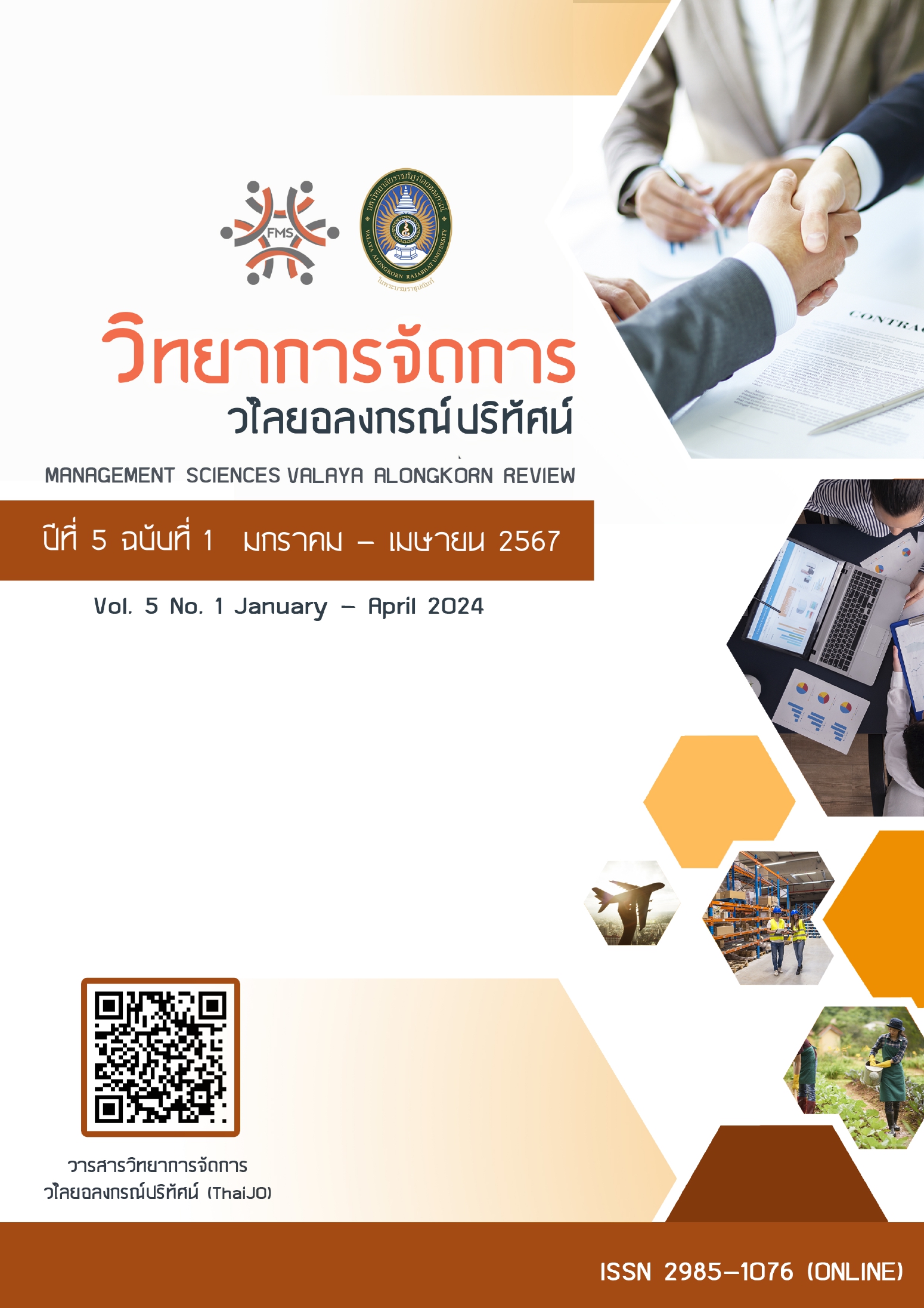คุณลักษณะที่ส่งผลต่อความตั้งใจเป็นผู้ประกอบการของนักศึกษาระดับปริญญาตรี คณะบริหารธุรกิจและศิลปศาสตร์ มหาวิทยาลัยเทคโนโลยีราชมงคลล้านนาตาก
Main Article Content
บทคัดย่อ
การวิจัยมีวัตถุประสงค์เพื่อศึกษา 1) ข้อมูลพื้นฐานทั่วไป 2) ระดับความคิดเห็นคุณลักษณะและความตั้งใจในการเป็นผู้ประกอบการ และ3) ปัจจัยที่ส่งผลต่อความตั้งใจเป็นผู้ประกอบการของนักศึกษาระดับปริญญาตรี โดยกลุ่มตัวอย่างที่ใช้ในการวิจัย คือ นักศึกษาระดับปริญญาตรี
คณะบริหารธุรกิจและศิลปศาสตร์ จำนวน 356 คน เก็บรวบรวมข้อมูลโดยใช้แบบสอบถาม วิเคราะห์ข้อมูลโดยใช้สถิติเชิงพรรณนา และการวิเคราะห์พหุถดถอย (Multiple regression) โดยใช้วิธีการแบบ Enter
ผลการศึกษาพบว่า 1) ผู้ให้ข้อมูลส่วนใหญ่เป็นเพศหญิง ส่วนใหญ่ศึกษาอยู่ในสาขาการบัญชี อายุระหว่าง 21-23 ปี เป็นนักศึกษาชั้นปีที่ 1 ส่วนใหญ่มีประสบการณ์ในการทำงานระหว่างเรียน และครอบครัวไม่ได้เป็นผู้ประกอบการหรือประกอบธุรกิจส่วนตัว 2) นักศึกษาให้ความคิดเห็นต่อคุณลักษณะในการเป็นผู้ประกอบการ โดยรวมอยู่ในระดับมาก ( = 3.704) และความตั้งใจในการเป็นผู้ประกอบการ โดยรวมอยู่ในระดับมาก (
= 3.875) และ3) ปัจจัยที่มีผลเชิงบวกต่อความตั้งใจเป็นผู้ประกอบการ อย่างมีนัยสำคัญทางสถิติที่ระดับ 0.05 มีจำนวน 4 ตัวแปร ได้แก่ ด้านความมุ่งมั่นในความสำเร็จ ด้านความกล้าเผชิญความเสี่ยง ด้านความอดทนต่อความคลุมเครือ และด้านความคิดสร้างสรรค์ ในขณะเดียวกันปัจจัยที่มีผลเชิงลบ อย่างมีนัยสำคัญทางสถิติที่ระดับ 0.01 ได้แก่ ประสบการณ์ในการทำงานระหว่างเรียน และครอบครัวประกอบธุรกิจส่วนตัว
Article Details

อนุญาตภายใต้เงื่อนไข Creative Commons Attribution-NonCommercial-NoDerivatives 4.0 International License.
บทความ ข้อความ ภาพประกอบ และตารางประกอบที่ลงพิมพ์ในวารสารเป็นความคิดเห็นส่วนตัวของผู้นิพนธ์ ถือเป็นความรับผิดชอบของผู้นิพนธ์แต่เพียงผู้เดียว กองบรรณาธิการไม่จำเป็นต้องเห็นตามและไม่มีส่วนรับผิดชอบใด ๆ
เอกสารอ้างอิง
กองการศึกษาตาก. (2566). จำนวนนักศึกษา. สืบค้นจาก https://tak.rmutl.ac.th.
ธนาคารกรุงเทพ จำกัด มหาชน. (2562). การเป็นผู้ประกอบการ. สืบค้นจาก https://www.bangkokbanksme.com.
บุญชม ศรีสะอาด. (2553). การวิจัยเบื้องต้น. สุวีริยาสาสน.
ภัทรานิษฐ์ สรเสริมสมบัติ. (2563). คุณลักษณะที่ส่งผลต่อความตั้งใจเป็นผู้ประกอบการ: กรณีศึกษานักศึกษาบริหารธุรกิจมหาวิทยาลัยราชภัฏเชียงใหม่. วารสารวิทยาการจัดการ มหาวิทยาลัยราชภัฎเชียงราย. 15(2), 117-142.
ภัทราพร เกษสังข์. (2559). การวิจัยปฏิบัติการ. กรุงเทพฯ: สำนักพิมพ์แห่งจุฬาลงกรณ์มหาวิทยาลัย.
อมินดารา อริยธาดา อังศินันท์ อินทรกำแหง และกฤตติพัฒน์ ชื่นพิทยาวุฒิ. (2565). รูปแบบความสัมพันธ์เชิงสาเหตุด้านคุณลักษณะทางจิตและสภาพแวดล้อมทางการศึกษาที่ส่งผลต่อพฤติกรรมการมุ่งเน้นการเป็นผู้ประกอบการ โดยส่งผ่านความตั้งใจที่จะเป็นผู้ประกอบการของนักศึกษา สาขาผู้ประกอบการ. วารสารการวัดผลการศึกษา. 39(105), 273-283.
อารยา องค์เอี่ยม และพงศ์ธารา วิจิตเวชไพศาล. (2561). การตรวจสอบคุณภาพเครื่องมือวิจัย. วิสัญญีสาร. 44(1), 36-42.
อำพล นววงศ์เสถียร ภูษิต วงษ์เล็ก ภิศาชล พรมวงษ์ กรรณิการ์ สุสม บุษยา วงษ์ชวลิตกุล และเฉลิมพร เย็นเยือก. (2564). การศึกษา ความเชื่อ แรงจูงใจ และความคิดสร้างสรรค์ที่มีผลต่อความตั้งใจในการเป็นผู้ประกอบการของนักศึกษาในสถาบันอุดมศึกษาในสังกัดเครือข่ายภาคกลางตอนบนในประเทศไทย. วารสารปรัชญาปริทรรศน์. 26(2), 1-20.
Aaker, D. A. (2013). Strategic market management. 10th Ed. New Jerseys: Wiley.
Ajzen, I. (1991). The theory of planned behavior. Organizational behavior and human decision processes. 50(2), 179-211.
Altinay, L., Madanoglu, M., Daniele, R., & Lashley, C. (2012). The Influence of Family Tradition and Psychological Traits on Entrepreneurial Intention. International Journal of Hospitality Management. 31(2), 489-499.
Bleeker, I. (2011). The Influence of Entrepreneurial Orientation on the Innovation Process: An empirical research on manufacturing SMEs. University of Twente, Business Administration.
Dolinger, M. J. (2008). Entrepreneurship: strategies and resources. 4th Ed. Marsh Publications Lombard Illinois.
Dzisi & Odoom. (2017). Entrepreneurship Education and Training in Higher Educational Institutions in Ghana. Springer Science Business Media. 15(1), 436–452.
Fawwaaz, D. (2017). The theory of planned behavior and the entrepreneurial event Model As predictive models’ entrepreneurial intention. Faculty of the Humanities University of Cape Town. Dissertation and Thesis.
Ferreira & Susana Azevedo. (2007). Entrepreneurial Orientation Asama in Resource and Capability on Small Firm’s Growth. University of Beira Interior.
Guojin, C. (2011). Study and Practice on Training Scheme of University Student’s Entrepreneurship Ability. Proceeding of International Conference on Information and Management Engineering ICCIC: Computing and Intelligent Systems.
Hatten, T. S. (2006). Small Business Management: Entrepreneurship and Beyond. 3rd ed. Boston: Houghton Mifflin.
Karabulut, A. T. (2016). Personality Traits on Entrepreneurial Intention. Procedia-Social and Behavioral Sciences. 12-21.
Mary, A. C. (2003). Entrepreneurship in action. 2nd Ed. Upper Saddle River, New Jersey: Prentice Hall.
Moroni, I., Arruda, A., & Araujo, K. (2015). The Design and Technological Innovation: How to Understand the Growth of Startups Companies in Competitive Business Environment. Procedia Manufacturing. 3(Ahfe). 2199-2204.
Prabandari, S. P., & Sholihah, P. I. (2014). The Influence of Theory of Planned Behavior and Entrepreneurship Education towards entrepreneurial Intention. Journal of Economics, Business and Accountancy Ventura. 17(3), 385–392.
Rotter, J. B. (1982). The development and application of social learning theory. New York:Pracger Publishers.
Sanchez, J. C. (2011). University training for entrepreneurial competencies: its impact on intention of venture creation. International Entrepreneurship and Management Journal. 7(2), 239–254.
Yamane, T. (1973). Statistics an introductory analysis. Harper & Row.
Yonca, G. (2006). Entrepreneurial characteristics amongst university students Some insights for entrepreneurship education and training in Turkey. Entrepreneurial Characteristics in Turkey. 48(1), 25–39.


